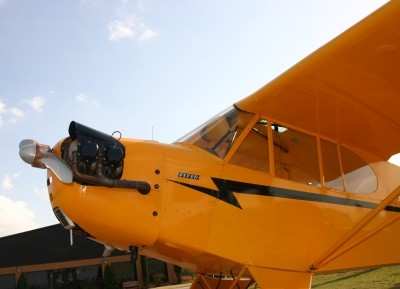Flight Instructor Stated That The Pilot Receiving Instruction Had Been “Making Really Steep Turns”
Location: Winter Haven, Florida Accident Number: ERA22LA107
Date & Time: January 12, 2022, 14:27 Local Registration: N88509
Aircraft: Piper J3C Aircraft Damage: Substantial
Defining Event: Loss of control in flight Injuries: 2 Serious
Flight Conducted Under: Part 91: General aviation - Instructional

Analysis: The pilot receiving instruction had not flown a float-equipped airplane in 3 years, so the flight instructor considered the training flights as review. The flight instructor stated that, during their 2-hour morning flight, the pilot receiving instruction sat in the front seat and that he tended to “fly too slow” and “turn sharply.” The instructor had to “push the nose down on several occasions.” After eating lunch and refueling the airplane, the afternoon flight began, with the pilot receiving instruction sitting in the rear seat. The flight instructor estimated that they had been flying for about 1 hour when the accident occurred.
Neither the flight instructor nor the pilot receiving instruction had recollection of the accident, but the flight instructor recalled thinking that the pilot receiving instruction might not have been able to see the instruments well from the rear seat or that he was being inattentive.
A witness stated that the airplane made two passes over a lake and that, as the airplane descended toward the lake during the second pass, the right float made a small splash as it touched the water. The airplane then climbed a couple hundred feet, turned to the right in a steep angle, and descended toward the ground in a near-vertical nose-down attitude. The witness did not hear the engine during the descent.

Postaccident examination of the airframe and engine revealed no evidence of preimpact mechanical malfunctions or failures that would have precluded normal operation. Given the reported application of carburetor heat during all approaches, it is unlikely that carburetor icing affected engine performance.
After learning about the witness’ observations, the flight instructor stated that the pilot receiving instruction had been “making really steep turns” and “was too slow on airspeed.” The flight instructor further stated that he was too slow to correct the pilot. Thus, it is likely that the pilot receiving instruction maintained insufficient airspeed and banked too steeply, which resulted in an exceedance of the airplane's critical angle of attack and a subsequent aerodynamic stall, and that the flight instructor did not take action in time to prevent the accident.
Probable Cause and Findings: The National Transportation Safety Board determines the probable cause(s) of this accident to be -- The pilot receiving instruction’s failure to maintain airspeed during a turn, which resulted in an exceedance of the airplane's critical angle of attack and a subsequent aerodynamic stall. Contributing to the accident was the flight instructor’s failure to take remedial action in a timely manner.
 NTSB Final Report: Rutan Long-EZ
NTSB Final Report: Rutan Long-EZ ANN FAQ: Turn On Post Notifications
ANN FAQ: Turn On Post Notifications Classic Aero-TV: ICAS Perspectives - Advice for New Air Show Performers
Classic Aero-TV: ICAS Perspectives - Advice for New Air Show Performers ANN's Daily Aero-Linx (06.28.25)
ANN's Daily Aero-Linx (06.28.25) Aero-News: Quote of the Day (06.28.25)
Aero-News: Quote of the Day (06.28.25)




